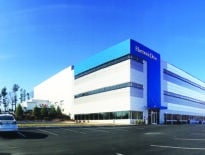Douglas Reed
CEO, Meridian Assoc.
Age: 63
Industry experience: 40 years
Douglas Reed has ambitious plans for the growth of Meridian Assoc. as he takes over its leadership during a global economic crisis. The business consultant and author is the new president and CEO of the civil engineering firm, which has 35 employees offices in Beverly and Westborough. A former executive for several of the region’s leading engineering firms, Reed advised utilities and companies in the architecture and engineering industries for the past decade at the consultancy he founded, FosterGrowth.
Q: How is Meridian Assoc. adjusting to the new workplace norms, and what’s it like to lead a company during a pandemic lockdown?
A: I’m on my seventh week now. When I arrived, I was the only one in the office for about two weeks, at the very beginning of the work-from-home phenomenon. There were a few people, the two founders working with the transition every day. It’s unique to be working for a company where I haven’t met half the employees, but we’ve seen each other on multiple conference calls.
Q: What changes has the firm made to its day-to-day operations?
A: The phones and remote communication access to servers were working when I got here and continues to work quite well. It’s not only our office, but the client world and our accountants and bankers, and everybody is talking to each other from their home and productivity has not skipped a beat.
I did an employee survey on Monday, and 90 percent of the people say they enjoy working from home. The big thing is when they come back, because 80 percent of them say they would be happy to work from home forever. We asked them if they were comfortable coming back to the office and 70 percent said no, so we’ve got some work cut out to make sure the office is safe for them. My plan is to let them work from home through the end of the year.
I’m on a group of 60 or so CEOs in architecture and engineering, and those who are in urban areas think they’re going to be working from home. There will be some profound implications for all businesses. How will individuals network if you’re sales- or revenue-responsible? Right now, it’s video calls for everything. That’s something I’m puzzling with: how you connect and get to know everybody when you’re in video mode.
Q: Where are the growth opportunities for Meridian?
A: Everybody is beginning to ponder what their services will be coming out of this and whether they need to modify them. In my 10 years as a business consultant, I helped firms focus on market changes, social changes and technological changes. Anybody in health care is doing pretty well right now. For Meridian, which does a lot of site work and civil site development, that means those facilities could be expanding.
On the housing side, people who own condos and apartments are also doing pretty well. The thinking is they have fairly consistent revenue streams, unlike the restaurants and nail salons. Work from home was 20 years in the making, and now that we’ve been thrown into the virtual world, the groups I’m involved with think it’s largely here to stay. There will be some options, but those who don’t want to drive through traffic will work from home.
The ones who are uncomfortable with the city will move. In the 1980s, the engineering and architecture firms were all moving to Route 128 and even 495. Then they’ve been going back to Boston, but we could see a reversal. That could be an opportunity for developers.
Q: How are clients approaching whether to move forward with new projects?
A: They have not slowed down. Developers are looking for opportunities to acquire properties and subdivide land, and they are still collectively feeling this is a temporary situation. If the impact on the economy endures to the end of the year, I expect things to fall off, but we haven’t seen it yet. Our clients are still describing for us the next two or three projects they have coming up.
Q: What new technological tools are affecting how civil engineers do their job?
A: We’re involved with LiDAR, a new type of survey technology, and it’s a breakthrough where you can get accurate data down to an accuracy of an inch or so. You can get data just from driving down a road or flying over it with a drone. That’s a sea change from the survey days where people had to run equipment along the ground. A construction company can take this and create a 3D model and do simulations and build the whole site and building virtually, inside and out, as accurately as the engineering drawing. It’s right down to the bolts and light switches. And they can throw in variables such as different materials and it changes the cost. If you’re going to renovate a building, you can get the existing conditions very accurately and find out what the ultimate buildout will be.
Q: What are some of the takeaways from “Lead a Movement: The Insider’s Guide to Powerful Strategy Execution,” your book on business strategy?
A: My book is a lot of what I’ve learned over 30 years in several architecture and engineering and environmental firms. I had terrific mentors along the way. My passion as an engineer grew more and more into the business side, and enjoyed a growth environment. Any type of corporate initiative in a professional world, it’s very important to have the employees support it. At Meridien, it’s easier because we are an employee stock ownership company. It’s important to conduct an analysis of what the employees’ goals are. We identify core motivators and company goals that relate to them. The second is, in any strategy development, to involve a key influencer: an employee who’s respected by others, and whose opinions are seen as credible. That’s different than having the senior people get together: this is more of a cross-section. The third is: it’s a substantial effort to implement that strategy. The staff is going to need support: some learning or coaching programs. The hard part is execution and that’s where strategies fail: the execution phase.
Reed’s Five Favorite Charter Sailboat Destinations:
- Italy’s Amalfi Coast
- Virgin Islands
- Vineyard Sound
- Boston Harbor
- Chesapeake Bay




 |
| 


